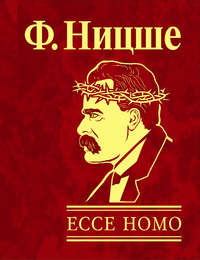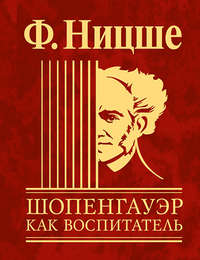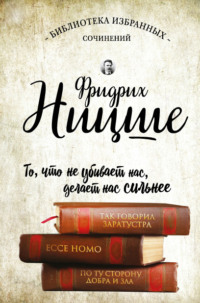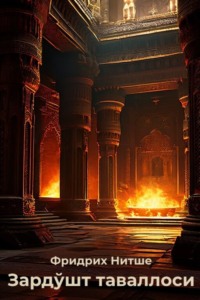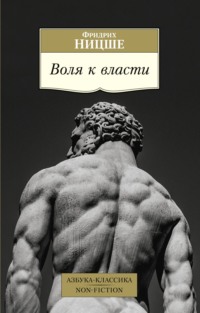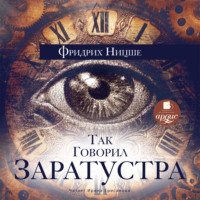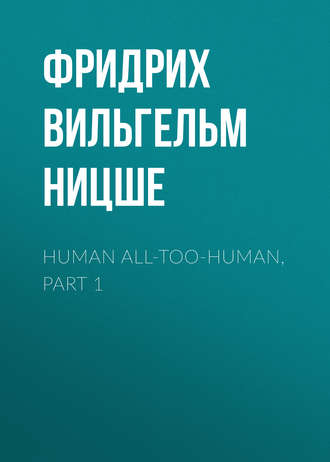 полная версия
полная версияHuman All-Too-Human, Part 1
The Limits of Uprightness. – Even the most upright author lets fall a word too much when he wishes to round off a period.
192The Best Author. – The best author will be he who is ashamed to become one.
193Draconian Law Against Authors. – One should regard authors as criminals who only obtain acquittal or mercy in the rarest cases, – that would be a remedy for books becoming too rife.
194The Fools of Modern Culture. – The fools of mediæval courts correspond to our feuilleton writers; they are the same kind of men, semi-rational, witty, extravagant, foolish, sometimes there only for the purpose of lessening the pathos of the outlook with fancies and chatter, and of drowning with their clamour the far too deep and solemn chimes of great events; they were formerly in the service of princes and nobles, now they are in the service of parties (since a large portion of the old obsequiousness in the intercourse of the people with their prince still survives in party-feeling and party-discipline). Modern literary men, however, are generally very similar to the feuilleton writers, they are the "fools of modern culture," whom one judges more leniently when one does not regard them as fully responsible beings. To look upon writing as a regular profession should justly be regarded as a form of madness.
195After the Example of the Greeks. – It is a great hindrance to knowledge at present that, owing to centuries of exaggeration of feeling, all words have become vague and inflated. The higher stage of culture, which is under the sway (though not under the tyranny) of knowledge, requires great sobriety of feeling and thorough concentration of words – on which points the Greeks in the time of Demosthenes set an example to us. Exaggeration is a distinguishing mark of all modern writings, and even when they are simply written the expressions therein are still felt as too eccentric. Careful reflection, conciseness, coldness, plainness, even carried intentionally to the farthest limits, – in a word, suppression of feeling and taciturnity, – these are the only remedies. For the rest, this cold manner of writing and feeling is now very attractive, as a contrast; and to be sure there is a new danger therein. For intense cold is as good a stimulus as a high degree of warmth.
196Good Narrators, Bad Explainers. – In good narrators there is often found an admirable psychological sureness and logicalness, as far as these qualities can be observed in the actions of their personages, in positively ludicrous contrast to their inexperienced psychological reasoning, so that their culture appears to be as extraordinarily high one moment as it seems regrettably defective the next. It happens far too frequently that they give an evidently false explanation of their own heroes and their actions, – of this there is no doubt, however improbable the thing may appear. It is quite likely that the greatest pianoforte player has thought but little about the technical conditions and the special virtues, drawbacks, usefulness, and tractability of each finger (dactylic ethics), and makes big mistakes whenever he speaks of such things.
197The Writings of Acquaintances and Their Readers. – We read the writings of our acquaintances (friends and enemies) in a double sense, inasmuch as our perception constantly whispers, "That is something of himself, a remembrance of his inward being, his experiences, his talents," and at the same time another kind of perception endeavours to estimate the profit of the work in itself, what valuation it merits apart from its author, how far it will enrich knowledge. These two manners of reading and estimating interfere with each other, as may naturally be supposed. And a conversation with a friend will only bear good fruit of knowledge when both think only of the matter under consideration and forget that they are friends.
198Rhythmical Sacrifice. – Good writers alter the rhythm of many a period merely because they do not credit the general reader with the ability to comprehend the measure followed by the period in its first version; thus they make it easier for the reader, by giving the preference to the better known rhythms.. This regard for the rhythmical incapacity of the modern reader has already called forth many a sigh, for much has been sacrificed to it. Does not the same thing happen to good musicians?
199The Incomplete As an Artistic Stimulus. – The incomplete is often more effective than perfection, and this is the case with eulogies. To effect their purpose a stimulating incompleteness is necessary, as an irrational element, which calls up a sea before the hearer's imagination, and, like a mist, conceals the opposite coast, i. e. the limits of the object of praise. If the well-known merits of a person are referred to and described at length and in detail, it always gives rise to the suspicion that these are his only merits. The perfect eulogist takes his stand above the person praised, he appears to overlook him. Therefore complete praise has a weakening effect.
200Precautions in Writing and Teaching. – Whoever has once written and has been seized with the passion for writing learns from almost all that he does and experiences that which is literally communicable. He thinks no longer of himself, but of the author and his public; he desires insight into things; but not for his own use. He who teaches is mostly incapable of doing anything for his own good: he is always thinking of the good of his scholars, and all knowledge delights him only in so far as he is able to teach it. He comes at last to regard himself as a medium of knowledge, and above all as a means thereto, so that he has lost all serious consideration for himself.
201The Necessity For Bad Authors. – There will always be a need of bad authors; for they meet the taste of readers of an undeveloped, immature age – these have their requirements as well as mature readers. If human life were of greater length, the number of mature individuals would be greater than that of the immature, or at least equally great; but, as it is, by far the greater number die too young: i. e. there are always many more undeveloped intellects with bad taste. These demand, with the greater impetuosity of youth, the satisfaction of their needs, and they insist on having bad authors.
202Too Near and Too Far. – The reader and the author very often do not understand each other, because the author knows his theme too well and finds it almost slow, so that he omits the examples, of which he knows hundreds; the reader, however, is interested in the subject, and is liable to consider it as badly proved if examples are lacking.
203A Vanished Preparation For Art. – Of everything that was practised in public schools, the thing of greatest value was the exercise in Latin style, – this was an exercise in art, whilst all other occupations aimed only at the acquirement of knowledge. It is a barbarism to put German composition before it, for there is no typical German style developed by public oratory; but if there is a desire to advance practice in thought by means of German composition, then it is certainly better for the time being to pay no attention to style, to separate the practice in thought, therefore, from the practice in reproduction. The latter should confine itself to the various modes of presenting a given subject, and should not concern itself with the independent finding of a subject. The mere presentment of given subject was the task of the Latin style, for which the old teachers possessed a long vanished delicacy of ear. Formerly, whoever learned to write well in a modern language had to thank this practice for the acquirement (now we are obliged to go to school to the older French writers). But yet more: he obtained an idea of the loftiness and difficulty of form, and was prepared for art in the only right way: by practice.
204Darkness and Over-brightness Side by Side. – Authors who, in general, do not understand how to express their thoughts clearly are fond of choosing, in detail, the strongest, most exaggerated distinctions and superlatives, – thereby is produced an effect of light, which is like torchlight in intricate forest paths.
205Literary Painting. – An important object will be best described if the colours for the painting are taken out of the object itself, as a chemist does, and then employed like an artist, so that the drawing develops from the outlines and transitions of the colours. Thus the painting acquires something of the entrancing natural element which gives such importance to the object itself.
206Books Which Teach How to Dance. – There are authors who, by representing the impossible as possible, and by talking of morality and cleverness as if both were merely moods and humours assumed at will, produce a feeling of exuberant freedom, as if man stood on tiptoe and were compelled to dance from sheer, inward delight.
207Unfinished Thoughts. – Just as not only manhood, but also youth and childhood have a value per se, and are not to be looked upon merely as passages and bridges, so also unfinished thoughts have their value. For this reason we must not torment a poet with subtle explanations, but must take pleasure in the uncertainty of his horizon, as if the way to further thoughts were still open. We stand on the threshold; we wait as for the digging up of a treasure, it is as if a well of profundity were about to be discovered. The poet anticipates something of the thinker's pleasure in the discovery of a leading thought, an makes us covetous, so that we give chase to it; but it flutters past our head and exhibits the loveliest butterfly-wings, – and yet it escapes us.
208The Book Grown Almost Into a Human Being. – Every author is surprised anew at the way in which his book, as soon as he has sent it out, continues to live a life of its own; it seems to him as if one part of an insect had been cut off and now went on its own way. Perhaps he forgets it almost entirely, perhaps he rises above the view expressed therein, perhaps even he understands it no longer, and has lost that impulse upon which he soared at the time he conceived the book; meanwhile it seeks its readers, inflames life, pleases, horrifies, inspires new works, becomes the soul of designs and actions, – in short, it lives like a creature endowed with mind and soul, and yet is no human being. The happiest fate is that of the author who, as an old man, is able to say that all there was in him of life-inspiring, strengthening, exalting, enlightening thoughts and feelings still lives on in his writings, and that he himself now only represents the gray ashes, whilst the fire has been kept alive and spread out. And if we consider that every human action, not only a book, is in some way or other the cause of other actions, decisions, and thoughts; that everything that happens is inseparably connected with everything that is going to happen, we recognise the real immortality, that of movement, – that which has once moved is enclosed and immortalised in the general union of all existence, like an insect within a piece of amber.
209Joy in Old Age. – The thinker, as likewise the artist, who has put his best self into his works, feels an almost malicious joy when he sees how mind and body are being slowly damaged and destroyed by time, as if from a dark corner he were spying a thief at his money-chest, knowing all the time that it was empty and his treasures in safety.
210Quiet Fruitfulness. – The born aristocrats of the mind are not in too much of a hurry; their creations appear and fall from the tree on some quiet autumn evening, without being rashly desired, instigated, or pushed aside by new matter. The unceasing desire to create is vulgar, and betrays envy, jealousy, and ambition. If a man is something, it is not really necessary for him to do anything – and yet he does a great deal. There is a human species higher even than wie "productive" man.
211Achilles and Homer. – It is always like the case of Achilles and Homer, – the one has the experiences and sensations, the other describes them. A genuine author only puts into words the feelings and adventures of others, he is an artist, and divines much from the little he has experienced. Artists are by no means creatures of great passion; but they frequently represent themselves as such with the unconscious feeling that their depicted passion will be better believed in if their own life gives credence to their experience in these affairs. They need only let themselves go, not control themselves, and give free play to their anger and their desires, and every one will immediately cry out, "How passionate he is!" But the deeply stirring passion that consumes and often destroys the individual is another matter: those who have really experienced it do not describe it in dramas, harmonies or romances. Artists are frequently unbridled individuals, in so far as they are not artists, but that is a different thing.
212Old Doubts About the Effect of Art. – Should pity and fear really be unburdened through tragedy, as Aristotle would have it, so that the hearers return home colder and quieter? Should ghost-stories really make us less fearful and superstitious? In the case of certain physical processes, in the satisfaction of love, for instance, it is true that with the fulfilment of a need there follows an alleviation and temporary decrease in the impulse. But fear and pity are not in this sense the needs of particular organs which require to be relieved. And in time every instinct is even strengthened by practice in its satisfaction, in spite of that periodical mitigation. It might be possible that in each single case pity and fear would be soothed and relieved by tragedy; nevertheless, they might, on the whole, be increased by tragic influences, and Plato would be right in saying that tragedy makes us altogether more timid and susceptible. The tragic poet himself would then of necessity acquire a gloomy and fearful view of the world, and a yielding, irritable, tearful soul; it would also agree with Plato's view if the tragic poets, and likewise the entire part of the community that derived particular pleasure from them, degenerated into ever greater licentiousness and intemperance. But what right, indeed, has our age to give an answer to that great question of Plato's as to the moral influence of art? If we even had art, – where have we an influence, any kind of an art-influence?
213Pleasure in Nonsense. – How can we take pleasure in nonsense? But wherever there is laughter in the world this is the case: it may even be said that almost everywhere where there is happiness, there is found pleasure in nonsense. The transformation of experience into its opposite, of the suitable into the unsuitable, the obligatory into the optional (but in such a manner that this process produces no injury and is only imagined in jest), is a pleasure; for it temporarily liberates us from the yoke of the obligatory, suitable and experienced, in which we usually find our pitiless masters; we play and laugh when the expected (which generally causes fear and expectancy) happens without bringing any injury. It is the pleasure felt by slaves in the Saturnalian feasts.
214The Ennobling of Reality. – Through the fact that in the aphrodisiac impulse men discerned a godhead and with adoring gratitude felt it working within themselves, this emotion has in the course of time become imbued with higher conceptions, and has thereby been materially ennobled. Thus certain nations, by virtue of this art of idealisation, have created great aids to culture out of diseases, – the Greeks, for instance, who in earlier centuries suffered from great nervous epidemics (like epilepsy and St. Vitus' Dance), and developed out of them the splendid type of the Bacchante. The Greeks, however, enjoyed an astonishingly high degree of health – their secret was, to revere even disease as a god, if it only possessed power.
215Music. – Music by and for itself is not so portentous for our inward nature, so deeply moving, that it ought to be looked upon as the direct language of the feelings; but its ancient union with poetry has infused so much symbolism into rhythmical movement, into loudness and softness of tone, that we now imagine it speaks directly to and comes from the inward nature. Dramatic music is only possible when the art of harmony has acquired an immense range of symbolical means, through song, opera, and a hundred attempts at description by sound. "Absolute music" is either form per se, in 'the rude condition of music, when playing in time and with various degrees of strength gives pleasure, or the symbolism of form which speaks to the understanding even without poetry, after the two arts were joined finally together after long development and the musical form had been woven about with threads of meaning and feeling. People who are backward in musical development can appreciate a piece of harmony merely as execution, whilst those who are advanced will comprehend it symbolically. No music is deep and full of meaning in itself, it does not speak of "will," of the "thing-in-itself"; that could be imagined by the intellect only in an age which had conquered for musical symbolism the entire range of inner life. It was the intellect itself that first gave this meaning to sound, just as it also gave meaning to the relation between lines and masses in architecture, but which in itself is quite foreign to mechanical laws.
216Gesture and Speech. – Older than speech is the imitation of gestures, which is carried on unconsciously and which, in the general repression of the language of gesture and trained control of the muscles, is still so great that we cannot look at a face moved by emotion without feeling an agitation of our own face (it may be remarked that feigned yawning excites real yawning in any one who sees it). The imitated gesture leads the one who imitates back to the sensation it expressed in the face or body of the one imitated. Thus men learned to understand one another, thus the child still learns to understand the mother. Generally speaking, painful sensations may also have been expressed by gestures, and the pain which caused them (for instance, tearing the hair, beating the breast, forcible distortion and straining of the muscles of the face). On the other hand, gestures of joy were themselves joyful and lent themselves easily to the communication of the understanding; (laughter, as the expression of the feeling when being tickled, serves also for the expression of other pleasurable sensations). As soon as men understood each other by gestures, there could be established a symbolism of gestures; I mean, an understanding could be arrived at respecting the language of accents, so that first accent and gesture (to which it was symbolically added) were produced, and later on the accent alone. In former times there happened very frequently that which now happens in the development of music, especially of dramatic music, – while music, without explanatory dance and pantomime (language of gesture), is at first only empty sound, but by long familiarity with that combination of music and movement the ear becomes schooled into instant interpretation of the figures of sound, and finally attains a height of quick understanding, where it has no longer any need of visible movement and understands the sound-poet without it. It is then called absolute music, that is music in which, without further help, everything is symbolically understood.
217The Spiritualising of Higher Art. – By virtue of extraordinary intellectual exercise through the art-development of the new music, our ears have been growing more intellectual. For this reason we can now endure a much greater volume of sound, much more "noise," because we are far better practised in listening for the sense in it than were our ancestors. As a matter of fact, all our senses have been somewhat blunted, because they immediately look for the sense; that is, they ask what "it means" and not what "it is," – such a blunting betrays itself, for instance, in the absolute dominion of the temperature of sounds; for ears which still make the finer distinctions, between eis and des, for instance, are now amongst the exceptions. In this respect our ear has grown coarser. And then the ugly side of the world, the one originally hostile to the senses, has been conquered for music; its power has been immensely widened, especially in the expression of the noble, the terrible, and the mysterious: our music now gives utterance to things which had formerly no tongue. In the same way certain painters have rendered the eye more intellectual, and have gone far beyond that which was formerly called pleasure in colour and form. Here, too, that side of the world originally considered as ugly has been conquered by the artistic intellect. What results from all this? The more capable of thought that eye and ear become, the more they approach the limit where they become senseless, the seat of pleasure is moved into the brain, the organs of the senses themselves become dulled and weak, the symbolical takes more and more the place of the actual, – and thus we arrive at barbarism in this way as surely as in any other. In the meantime we may say: the world is uglier than ever, but it represents a more beautiful world than has ever existed. But the more the amber-scent of meaning is dispersed and evaporated, the rarer become those who perceive it, and the remainder halt at what is ugly and endeavour to enjoy it direct, an aim, however, which they never succeed in attaining. Thus, in Germany there is a twofold direction of musical development, here a throng of ten thousand with ever higher, finer demands, ever listening more and more for the "it means," and there the immense countless mass which yearly grows more incapable of understanding what is important even in the form of sensual ugliness, and which therefore turns ever more willingly to what in music is ugly and foul in itself, that is, to the basely sensual.
218A Stone Is More of a Stone Than Formerly. – As a general rule we no longer understand architecture, at least by no means in the same way as we understand music. We have outgrown the symbolism of lines and figures, just as we are no longer accustomed to the sound-effects of rhetoric, and have not absorbed this kind of mother's milk of culture since our first moment of life. Everything in a Greek or Christian building originally had a meaning, and referred to a higher order of things; this feeling of inexhaustible meaning enveloped the edifice like a mystic veil. Beauty was only a secondary consideration in the system, without in any way materially injuring the fundamental sentiment of the mysteriously-exalted, the divinely and magically consecrated; at the most, beauty tempered horror– but this horror was everywhere presupposed. What is the beauty of a building now? The same thing as the beautiful face of a stupid woman, a kind of mask.
219The Religious Source of the Newer Music. – Soulful music arose out of the Catholicism re-established after the Council of Trent, through Palestrina, who endowed the newly-awakened, earnest, and deeply moved spirit with sound; later on, in Bach, it appeared also in Protestantism, as far as this had been deepened by the Pietists and released from its originally dogmatic character. The supposition and necessary preparation for both origins is the familiarity with music, which existed during and before the Renaissance, namely that learned occupation with music, which was really scientific pleasure in the masterpieces of harmony and voice-training. On the other hand, the opera must have preceded it, wherein the layman made his protest against a music that had grown too learned and cold, and endeavoured to re-endow Polyhymnia with a soul. Without the change to that deeply religious sentiment, without the dying away of the inwardly moved temperament, music would have remained learned or operatic; the spirit of the counter-reformation is the spirit of modern music (for that pietism in Bach's music is also a kind of counter-reformation). So deeply are we indebted to the religious life. Music was the counter-reformation in the field of art; to this belongs also the later painting of the Caracci and Caravaggi, perhaps also the baroque style, in any case more than the architecture of the Renaissance or of antiquity. And we might still ask: if our newer music could move stones, would it build them up into antique architecture? I very much doubt it. For that which predominates in this music, affections, pleasure in exalted, highly-strained sentiments, the desire to be alive at any cost, the quick change of feeling, the strong relief-effects of light and shade, the combination of the ecstatic and the naïve, – all this has already reigned in the plastic arts and created new laws of style: – but it was neither in the time of antiquity nor of the Renaissance.



